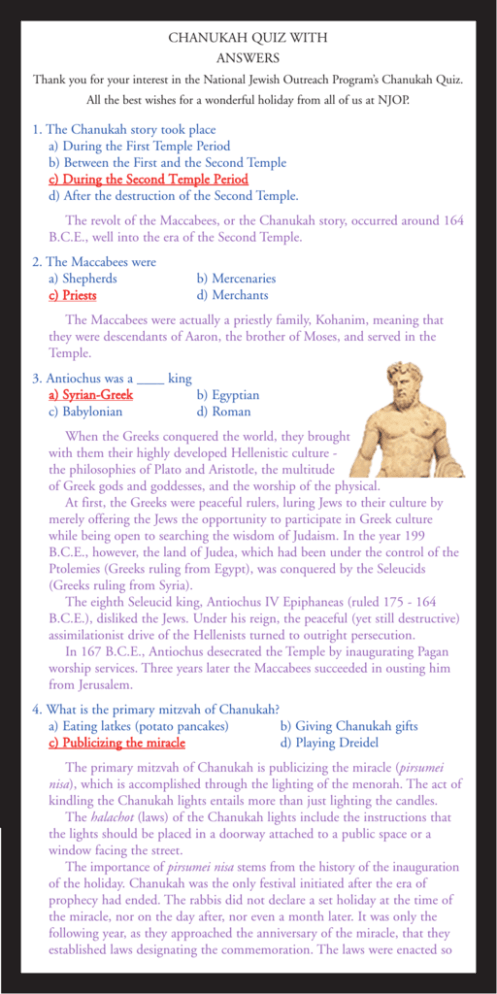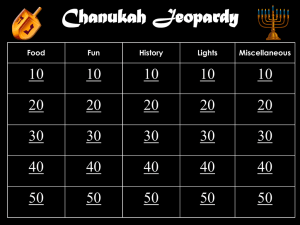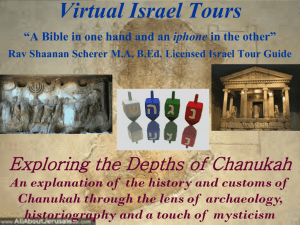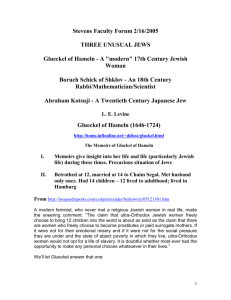Chanukah Quiz2007 answers
advertisement

CHANUKAH QUIZ WITH ANSWERS Thank you for your interest in the National Jewish Outreach Program’s Chanukah Quiz. All the best wishes for a wonderful holiday from all of us at NJOP. 1. The Chanukah story took place a) During the First Temple Period b) Between the First and the Second Temple c) During the Second Temple Period d) After the destruction of the Second Temple. The revolt of the Maccabees, or the Chanukah story, occurred around 164 B.C.E., well into the era of the Second Temple. 2. The Maccabees were a) Shepherds c) Priests b) Mercenaries d) Merchants The Maccabees were actually a priestly family, Kohanim, meaning that they were descendants of Aaron, the brother of Moses, and served in the Temple. 3. Antiochus was a ____ king a) Syrian-Greek b) Egyptian c) Babylonian d) Roman When the Greeks conquered the world, they brought with them their highly developed Hellenistic culture the philosophies of Plato and Aristotle, the multitude of Greek gods and goddesses, and the worship of the physical. At first, the Greeks were peaceful rulers, luring Jews to their culture by merely offering the Jews the opportunity to participate in Greek culture while being open to searching the wisdom of Judaism. In the year 199 B.C.E., however, the land of Judea, which had been under the control of the Ptolemies (Greeks ruling from Egypt), was conquered by the Seleucids (Greeks ruling from Syria). The eighth Seleucid king, Antiochus IV Epiphaneas (ruled 175 - 164 B.C.E.), disliked the Jews. Under his reign, the peaceful (yet still destructive) assimilationist drive of the Hellenists turned to outright persecution. In 167 B.C.E., Antiochus desecrated the Temple by inaugurating Pagan worship services. Three years later the Maccabees succeeded in ousting him from Jerusalem. 4. What is the primary mitzvah of Chanukah? a) Eating latkes (potato pancakes) b) Giving Chanukah gifts c) Publicizing the miracle d) Playing Dreidel The primary mitzvah of Chanukah is publicizing the miracle (pirsumei nisa), which is accomplished through the lighting of the menorah. The act of kindling the Chanukah lights entails more than just lighting the candles. The halachot (laws) of the Chanukah lights include the instructions that the lights should be placed in a doorway attached to a public space or a window facing the street. The importance of pirsumei nisa stems from the history of the inauguration of the holiday. Chanukah was the only festival initiated after the era of prophecy had ended. The rabbis did not declare a set holiday at the time of the miracle, nor on the day after, nor even a month later. It was only the following year, as they approached the anniversary of the miracle, that they established laws designating the commemoration. The laws were enacted so that the holiday would not only show the Jewish people’s hakarat hatov (acknowledgment of the good, gratitude) to G-d, but it would also serve as a reminder to the nation of what they had lost, what they had reclaimed, and what (Who) had allowed them to reclaim it. 5. The Chanukah candles must burn for at least a) 25 hours b) 1 hour c) 30 minutes d) 15 minutes In order to ensure that the lights are seen by many people, the lights of the menorah must burn for at least 30 minutes. 6. Who lights the menorah? a) The oldest person present b) The rabbi c) The youngest able person present d) Everyone can light their own menorah All adults are equally obligated in the lighting of the Chanukah lights and everyone may light their own menorah. The head of the household may, however, elect to kindle one set of Chanukah lights for the entire household. While it is obvious that young children should not be allowed to play with fire, children over the age of 9 should have the opportunity to light for educational purposes. 7. The Dreidel game became a Jewish tradition because: a) Jews were always involved in gambling b) To keep children entertained c) To hide their Torah classes from the Syrian-Greeks d) The Syrian-Greeks introduced it to the Jewish people When the Syrian-Greeks ruled Judea (in the year 167 BCE), they banned the study of Torah. The Jewish people, however, continued to study and to teach their children. Under the threat of death, they met in secret, leaving a lookout to watch for signs of the soldiers. When the lookout signaled, the books were quickly hidden and the Jews pretended to play a game. The letters on the dreidel (b-nun, d-gimel, v-hey and a-shin) stand for Neis Gadol Hayah Sham- A Great Miracle Happened There. In Israel, the dreidel has a Pey (p) instead of a Shin, for Neis Gadol Hayah Poh - A Great Miracle Happened Here. 8. Which is a traditional Chanukah food? a) Latkes/Potato Pancakes b) G’vina/Cheese c) Sufganiot/Doughnuts d) All of the above are traditional Chanukah foods. They all are! Because of the significance of oil in the miracle of Chanukah, it has become customary to partake of foods fried in oil during the holiday. Two traditional treats are latkes and sufganiot (potato pancakes and doughnuts). In honor of the story of Yehudit (see question 10), many people have the custom of eating dairy foods. A popular combination of the customs of dairy and oil is cottage cheese latkes. 9. Which of the following is not part of the additional prayers for Chanukah: a) Ya’ah’leh V’ya’vo, May there arise and come b) Ahl Ha’nee’seem, On the miracles c) Whole Hallel d) Ma’oz Tzur, Rock of ages Ya’ah’leh V’ya’vo (May there arise and come) is only recited on Biblical festivals and Rosh Chodesh (the new month), but not on Chanukah or Purim. Since Chanukah and Rosh Chodesh Tevet always coincide, however, on that day(s) the additional prayer is recited in honor of Rosh Chodesh. Ahl Ha’nee’seem (On the miracles) is added both to the Amidah and Birkat Hamazon/Grace After Meals (just as Ya’ah’leh V’ya’vo is added on Biblical festivals). Hallel is recited every morning of Chanukah and Ma’oz Tzur (Rock of Ages) is sung or recited after lighting the menorah. 10. Yehudit (Judith) made the Syrian-Greek General Holofernes sleepy by feeding him ____ and wine? a) Cheese b) Olives c) Steak d) Apples The abridged story of Yehudit: (For a full version, please visit the NJOP Chanukah page.) As the Hellenists laid siege to the town of Bethulia, the people grew discouraged and decided to surrender once their food ran out. Yehudit, the daughter of Yochanan the High Priest and a young widow, told the elders that she had a plan that would deliver the enemies into their hands, but they must not ask her what it was. They agreed. Taking with her one maidservant and a large basket of cheese, bread and wine, Yehudit left the city, was captured and brought before the general, Holofernes. Yehudit told Holofernes that she worried for those in the city who were suffering under the siege and had decided to come and tell him how to capture the city and, hopefully, receive, in return, mercy on her people. He encouraged her to go on, so she told him that the city’s food supply would soon run low. She proposed to stay with Holofernes in the camp of his army, but would return to Bethulia each day in order to find out how low the supplies were and report to him. Holofernes agreed to the plan. Once Yehudit had gained their trust, she informed Holofernes that the Bethulia was now out of food and there remained only to wait a few days. He invited her to come alone to his tent that night to celebrate. She agreed, insisting that he partake of her ‘renowned' goat cheese. As he ate the salty cheese, he grew thirsty and Yehudit hurried to give him the heavy wine she had brought with her. While Yehudit pretended to eat and drink, Holofernes became sluggish from imbibing and eating. Shortly thereafter, he was in a deep sleep. Calling her maidservant in, Yehudit took Holofernes' sword and cut off his head. The two women wrapped the head in a cloth and returned to Bethulia. Holofornes’ army fled in disarray. 11. The Syrian-Greek army was famous for its use of: a) Wooden Horses b) Catapults d) Elephants c) Bows and Arrows According to the Book of Maccabees, the Syrian-Greek armies used elephants as “tanks” and stomped their opponents. Indeed, Elazar Maccabee, one of the five Maccabee sons, was killed when an elephant he speared fell on top of him. 12.What had happened to almost all of the oil in the Temple? a) It had been defiled b) It was dirty c) It had been stolen d) It had been used for cooking The oil for the Temple Menorah had to be, according to Torah law, pure olive oil. What is pure olive oil? Pure olive oil (and this will explain why it took so long to get more) is made using just the first drop of each olive. Just as today we have “safety seals” to ensure that our food was not tampered with, the jars of oil for the Menorah were sealed with the seal of the High Priest. When the Maccabees drove the Syrian-Greeks out of the Temple, they found that the seals on all but one flask had been broken, rendering them unusable since it was impossible to tell whether or not the oil had been used for any idolatrous worship. The pure olive oil was thus defiled. 13. The patriarch of the Maccabee clan was: b) Matityahu (Mattathias) a) Judah c) Jonathan d) Johanan (See answer to question 15.) 14. The Maccabee rebellion began at a public ceremony of a Jew: a) Working on Shabbat b) Eating shrimp c) Sacrificing a pig d) Bowing to an idol (See answer to question 15.) 15. Another name for the Maccabees is: a) Hasmoneans b) Karaites c) Levites d) Israelites In the town of Modiin, west of Jerusalem, lived a man named Matityahu (Mattathias). He was from the Hasmonean family, which was one of the branches of the Kohanim (priests). In 167 B.C.E., Syrian-Greek soldiers came to the town and demanded that the Jews sacrifice a pig to one of their gods. Knowing that Matityahu was considered a righteous leader, they singled him out. But Matityahu refused to sacrifice the animal, even under threat of death. Not all the Jews of Modiin were so brave and devoted. When one of his fellow townsmen stepped forward and volunteered to sacrifice the pig, Matityahu, outraged at the treacherous act, grabbed a sword and slew the heretic. Matityahu’s sons joined him and they attacked the soldiers, decimating the enemy by the end of the day. Matityahu and his sons then fled Modiin and took refuge in the hills. While Matityahu began the revolt, he did not live to see its end. After his passing, within a year of the start of the revolt, the leadership was taken up by his son Judah, a valiant soldier and a wise tactician. In the hills, Judah gathered a band of Jewish freedom fighters who were prepared to fight for the Jewish way of life. They became known as the Maccabees. 16. The Chanukah story is found in which Biblical book? a) Esther b) Kings II c) Ruth d) There is no Biblical book concerning Chanukah The Book of Maccabees, which related the story of Chanukah, is what is known as Apocrypha, non-Biblical texts. The books of the Apocrypha are often related to the Biblical texts, and written in a similar style, but were either written after the sages closed the Biblical canon (as is the case of the Book of Maccabees) or were not seen to have prophetic insights to guide the Jewish people in future times and were therefore not necessary to include in the Bible. 17. The Hellenist Syrian-Greek culture wanted the Jews to: a) Convert b) Proselytize c) Assimilate d) None of the above The Syrian-Greeks wanted the Jews to assimilate. They saw nothing wrong with Jews remaining Jews, just as long as they did it with lest zest and in a more “Greek” fashion. One G-d or twenty gods -- it made no difference to the Hellenists as long as one lived for what the Greeks valued in life -- the glorification of beauty. 18. The Syrian-Greeks prohibited which mitzvot? a) Brit Milah (Circumcision) b) Shabbat c) Rosh Chodesh (Celebration of the new month) d) All of the above The Syrian-Greeks prohibited Brit Milah, Shabbat and Rosh Chodesh. Here’s why. Rosh Chodesh/the Sanctification of the New Month - The Jewish people follow a lunar calendar and the very first commandment to the Jewish people in the Torah is: "This month shall be yours as the first of months." This commandment instructs Jews to sanctify the beginning of each new month, when the moon first reappears in the sky. In ancient times, when there was a Temple and a Sanhedrin (High Jewish Court), witnesses would come and testify that the new moon had been seen and the sages would then declare the month sanctified. What then could bother the Greeks about the Jews setting the calendar? When the Jews sanctified the new moon, it, in effect, stated to the world that G-d is in control of time. The month was not declared based on the counting of days, but rather based on the appearance of the new moon, according to G-d's commandment of how the months should be calculated. Since the Greeks wished to show that humankind was in control of nature, they felt threatened by the Jewish concept of Divinely ordained time. Also, by denying the Jews the ability to sanctify the new month, they inhibited the proper celebration of the Jewish holidays, which are based on dates which start with the declaration of the start of each new month. The Sabbath - "Six days shall you work and do all your labor, but the seventh day is Shabbat for the Lord your G-d. On it, you shall do no [creative] work." The seventh day is the Jewish Sabbath on which a Jew does no work. Why did the Greeks have a problem with a day of rest? The Hellenistic culture was a center of great creativity. From ancient Greek traditions, the Western world has inherited a remarkable legacy of literature, sculpture, philosophy, and architecture. Through their marvelous creations, the Greeks proclaimed their might over the world. Nothing seemed impossible for them to achieve, which led them to conclude that it was humanity that ruled the world. The idea of taking one day to let G-d run the world negated the Greek belief in their own control. It also forced them to acknowledge how lightly they treated their own deities, while the Jews were willing to set aside an entire day to their one deity. Circumcision - Remember, the Greeks idealized the beauty of the physical form, particularly the male body, as can be seen in so many of their sculptures. The idea that the Jews would willing mar the human body was outrageous to them. On a deeper level, however, circumcision represents humanity's ability to have control over one's physical self. The Greeks believed in fulfilling all of their passions, in contrast to Judaism's devotion to self discipline. While Judaism teaches humankind to strive to be like G-d, the Greeks created gods who acted with less dignity than many humans. Remember, it was Greek mythology that created nymphs and satyrs, philandering gods and promiscuous goddesses. They abhorred circumcision because it focused on the fact that a person is capable of channeling his/her passions.









